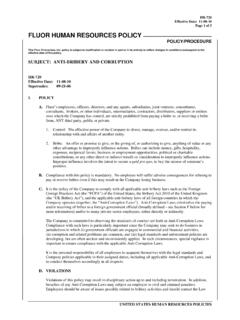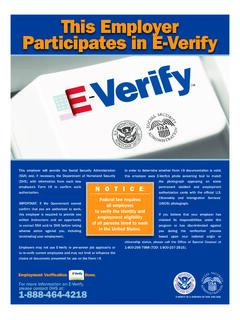Transcription of Fluor Corporation Corporate Governance Guidelines
1 Effective: 10/28/20 Supersedes: 10/30/19 Fluor Corporation Corporate Governance Guidelines The Board of Directors of Fluor Corporation (the "Company") has adopted the Corporate Governance Guidelines set forth below as a framework for the Governance of the Company. Role of the Board of Directors 1. Role and Responsibilities of the Board of Directors The Board of Directors, which is elected by the shareholders, is the ultimate decision-making body of the Company except with respect to those matters reserved to the shareholders. It approves the selection of the senior management team, which is charged with the conduct of the Company's business, and oversees the performance of senior management in conducting the Company's business. The duties of the Board of Directors are largely defined by the Delaware General Corporation Law, federal securities laws and regulations (notably those of the Securities and Exchange Commission) and the New York Stock Exchange listing standards.
2 The Board of Directors' core responsibilities include: advising and counseling management regarding significant issues facing the Company; assessing the performance of the Chief Executive Officer and senior management and setting compensation accordingly; senior management succession planning and development; overseeing the Company's integrity and ethics, and compliance with laws; evaluating and approving the Company's strategic direction and initiatives and monitoring their implementation and results; monitoring the Company's operating results and financial condition and overseeing the Company's financial reporting; understanding and assessing risks to the Company and monitoring the management of those risks; engaging in succession planning for the Board and key leadership roles on the Board and its committees; and nominating directors and shaping effective Corporate Governance .
3 2 Selection and Composition of the Board of Directors 2. Director Elections The Company's bylaws provide for majority voting in the election of directors in uncontested elections. Each director nominated for election at a meeting of shareholders in an uncontested election is expected to tender his or her contingent resignation for consideration in cases where the director is not elected by a majority of votes cast at such meeting. If the director is not elected by a majority of votes cast at such meeting, the Governance Committee will make a recommendation to the Board on whether to accept or reject the resignation, or whether other action should be taken. The Board will act on the Governance Committee's recommendation within 90 days following certification of the meeting results. In determining whether to accept or reject any such resignation, the Governance Committee and the Board shall take into consideration such factors as they believe relevant, including any action to address stated reasons for shareholders' "Against" votes and factors set forth in the Company's policies that are considered by the Governance Committee in evaluating potential candidates for the Board of Directors.
4 Unless applicable to all directors, the director(s) who tender(s) his or her resignation is expected to recuse himself or herself from the Board vote. Thereafter, the Board will promptly disclose its decision regarding whether to accept the director's resignation in a Form 8-K furnished to the Securities and Exchange Commission. If the Board accepts a director's resignation pursuant to this process, the Governance Committee shall recommend to the Board whether to fill such vacancy or reduce the size of the Board. If, for any reason, the members of the Board of Directors are not elected at an annual meeting, they may be elected thereafter at a special meeting of the shareholders called for that purpose in the manner provided in the bylaws. 3. Board of Directors Membership Criteria The Governance Committee is responsible for reviewing with the Board of Directors on an annual basis (and as needed), and recommending to the Board of Directors, the skills, experience, characteristics and other criteria for identifying and evaluating Board of Directors members.
5 The Governance Committee evaluates the composition of the Board of Directors annually (and as needed) to assess whether the skills, experience, characteristics and other criteria established by the Board of Directors are currently represented on the Board of Directors as a whole, and in individual directors, and to assess the criteria that may be appropriate in light of the Company's anticipated future needs. This assessment takes into consideration issues of diversity of thought and background (including gender, race, ethnicity and national background, geography and age). As a whole, the Board of Directors should include individuals with a diverse range of educational, business and cultural backgrounds and experience to give the Board of Directors depth and breadth in the mix of skills represented for the benefit of the Company's shareholders.
6 While all directors should possess business acumen and must exercise sound judgment in their oversight of the Company's operations, the Board of Directors endeavors to include an array of targeted skills and experience in its overall composition rather than requiring every director to possess the same skills, perspective and interests. Criteria that the Board of Directors looks for in director candidates include, among other things, an individual's business experience and skills, judgment, independence, integrity, reputation and international background, the individual's 3 understanding of such areas as finance, marketing, information technology, risk, regulation and public policy, whether the individual has the ability to commit sufficient time and attention to the activities of the Board of Directors, the fit of the individual's skills and personality with those of other directors in building a Board of Directors that is effective, collegial and responsive to the needs of the Company, and the absence of any potential conflicts with the Company's interests.
7 4. Selection of Director Candidates The Board of Directors is responsible for selecting the Company's director nominees and recommending them for election by the shareholders. The Governance Committee reviews the qualifications of incumbent directors in light of the criteria approved by the Board, and feedback from individual director evaluations, in determining whether to recommend directors for reelection to the Board. The Board of Directors has delegated the search and screening process for new directors to the Governance Committee. The Governance Committee reviews the qualifications of director candidates in light of the criteria approved by the Board, and determines whether to recommend them for election to the Board. As part of the search process for each new director, include women and minorities in the pool of candidates (and instruct any search firm the Committee engages to do so).
8 The Governance Committee also considers any recommendations for director candidates that are properly submitted by shareholders in accordance with the procedures described in the Company's annual proxy statement. 5. New Director Orientation and Continuing Education New directors are required to participate in the Company's director orientation process, which includes briefings on the extensive materials contained in the Company's Director Manual, and meetings with key management from operations and other functional areas such as finance, legal, human resources and compliance. The Company encourages its directors to participate in (and the Company reimburses reasonable costs relating to) continuing education programs to assist them in performing their Board of Directors responsibilities. 4 Board of Directors Leadership 6.
9 Selection of Chairman The Company's bylaws provide that the Board of Directors shall elect one of its members to be Chairman of the Board of Directors and shall fill any vacancy in the position of Chairman of the Board of Directors at such time and in such manner as the Board of Directors shall determine. The Governance Committee annually reviews the Board's leadership structure and recommends changes to the Board as appropriate. The Board elects the Chairman annually based on the recommendation of the Governance Committee. Currently, the positions of Chairman of the Board and Chief Executive Officer are separate. 7. Lead Independent Director To provide for independent leadership, the Board of Directors has a "Lead Independent Director." The Lead Independent Director is elected by the independent directors.
10 The Lead Independent Director's responsibilities include: (a) setting the agenda for and presiding over the executive sessions of the independent directors; (b) approving agendas and schedules for meetings of the Board of Directors and information sent to the Board; (c) chairing Board of Directors meetings in the Chairman's absence; (d) acting as a liaison between the independent directors and the Chairman; (e) consulting and communicating with shareholders as appropriate; (f) monitoring communications to the Board of Directors from shareholders and other interested parties; and (g) providing guidance on the orientation process for new directors. The Lead Independent Director also has the authority to call additional executive sessions as appropriate. The Lead Independent Director serves for a term of three years and may be re-elected by the independent directors.














